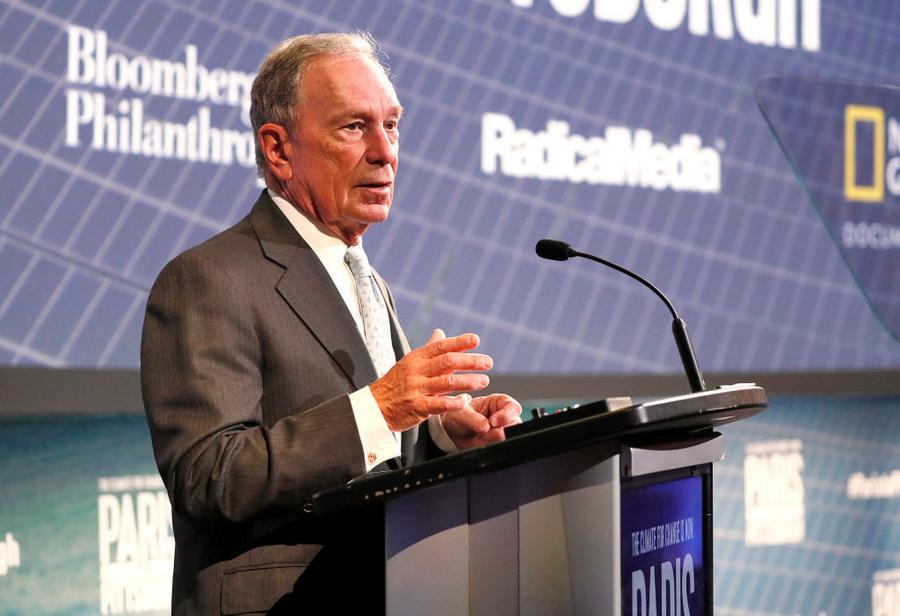With a net worth of $52.5 billion, Michael Bloomberg is the 15th wealthiest person in the world. Though his term as Mayor of New York City ended in 2013, he's still kept himself plenty busy. And now, he's announced his next endeavor: trying to become President of the United States.
Before we get into that, though, let's take a look at Bloomberg's impressive life story.
Born on Valentine's Day in 1942, Bloomberg grew up in a Jewish family in a Boston suburb. He attended John Hopkins University, graduating in 1964 with a Bachelor of Science in electrical engineering; he'd later serve on the board of trustees as chairman. In 1966, he received his MBA from Harvard.
Bloomberg's career took off in 1973 when he became a partner at Wall Street brokerage firm Salomon Brothers. The firm let him go in 1981, but not before sending him off with a hefty $10 million severance package. Rather than resting on his laurels, Bloomberg took that money and founded Innovative Market Systems, a financial software company that was founded on the idea that Wall Street companies would pay for quality financial data. The very first customer was Merrill Lynch, and the company thrived from there.

Paul Morigi/Getty Images for Bloomberg Philanthropies
Innovative Market Systems used a proprietary system (an innovative one, if you will) that Bloomberg created, called the Bloomberg Terminal. Financial companies use the terminal to analyze real-time data, allowing them to easily place trades. The company renamed itself to Bloomberg L.P. in 1987. Today, Bloomberg sports more than 325,000 terminal subscribers. As the namesake, Bloomberg served as the company's CEO and chairman until he pursued a mayoral candidacy in New York; he returned as CEO in late 2014 and still holds that position.
But let's jump back to 2001. A registered Democrat for his entire life, Bloomberg decided to switch to the Republican Party just prior to the election. He spent $74 million of his money for his campaign, primarily targeting people via television ads and direct mail. In one of the closest elections in New York City history, Bloomberg defeated his opponent, Mark Green. Bloomberg won more comfortably in the 2005 election.
In 2008, as his second term was ending, he sought an extension to New York City's term limits law. He argued that he should be allowed to run for a third term in 2009, since the Wall Street financial crisis needed sturdy, secure leadership. The City Council voted in his favor to extend the city's term limit to three consecutive terms. Bloomberg defeated his 2009 opponent, Bill Thompson, in a fairly close race, winning 50.6 to 46.0 percent.
In total, Bloomberg spent $268 million of his own money on re-election campaigns. He also chipped in $890,000 to provide free breakfast and lunch every day for his entire staff over 12 years.
Back in 1964, Bloomberg could only afford to send $5 to his alma mater. By the time he was running for mayor, his philanthropy had increased – and then some. Bloomberg donated $30 million to the New York Metropolitan Museum of Art, helping fund audio tours in dozens of languages. He also donated $30 million toward impoverished black and Latino men, and $7 million to promote gun control. Bloomberg was entitled to a $2.7 million salary as mayor over three terms. Instead, he chose to earn a mere $1 per year.
He also founded Bloomberg Philanthropies in 2006, focusing on public health, the environment, the arts, education, and government innovation. Through his organization, he's awarded a $6 million grant to the Environmental Defense Fund and has taken a strong stance on environmental issues. That includes serving as chairman of the C40 Cities Climate Leadership Group to locally reduce greenhouse gas emissions, committing $185 million to protect the world's oceans, and leading numerous pledges and coalitions to help educate others on the effects of climate change and encouraging action to better protect the planet. Just this year alone, he announced a Midwestern Collegiate Climate Summit in St. Louis and pledged $500 million to reduce climate impacts and shut down coal-fired plants by 2030, via the Beyond Carbon initiative.
He gave Johns Hopkins a bit of a raise, too. In 2018, Bloomberg sent over a $1.8 billion check that boosted his total contributions to the university to more than $3.3 billion.
And now he's setting his sights on the presidency. He filed papers in Alabama, officially announcing his entry into the 2020 election party. Critics have had mixed reactions to his announcement.
On the one hand, his huge personal fortune, proven corporate success and philanthropic efforts, and loyal infrastructure from his mayoral staff should work to his advantage. On the other, being mayor of New York his only political experience and he's 77 years old. That would make him the oldest person ever elected president.
Also playing against Bloomberg is the fact that no one who's served as New York City's mayor has ever been elected president. That's a streak that's lasted for more than 200 years.
We'll see if Bloomberg can buck that trend. Either way, it's been an impressive ride so far.
/2019/06/GettyImages-1129494067.jpg)
/2018/04/GettyImages-947243414.jpg)
/2018/11/GettyImages-1055007580.jpg)
/2017/05/GettyImages-684949162.jpg)
/2020/09/GettyImages-1184705004.jpg)
/2020/05/GettyImages-1181733126.jpg)
/2015/07/ghc.jpg)
/2023/01/Julian-McMahon.png)
/2022/06/joey-chestnut.png)
:strip_exif()/2020/06/taylor.png)
/2014/07/keith2.jpg)
/2009/11/Sigourney-Weaver.jpg)
/2010/05/Lenny-Kravitz-1.jpg)
/2012/09/Takeru-Kobayashi-1.jpg)
/2019/03/Karol-G.jpg)
/2011/03/Rickie-Fowler-1.jpg)
/2010/03/tw.jpg)
/2016/06/GettyImages-494820822.jpg)
/2019/01/Nikola-Jokic.jpg)
/2023/02/ozuna.jpg)
/2025/05/Aryna-Sabalenka.jpg)
/2009/12/Shania-Twain.jpg)
:strip_exif()/2009/09/Tiger-Woods.jpg)